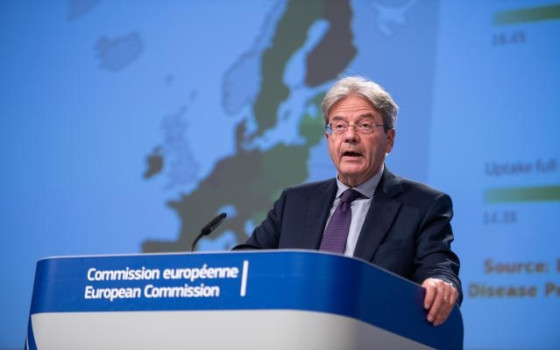
European Commission: The euro zone economy lost momentum in the second half of last year and continued during the current winter

- Europe and Arabs
- Tuesday , 16 January 2024 18:2 PM GMT
Brussels: Europe and the Arabs
The Finance and Economy Ministers of the European Union countries continued their meetings in Brussels, which began yesterday and will continue for two days. Discussions began at the level of the Finance Ministers of the countries of the single currency area “Euro”. Views were exchanged between the ministers and a delegation from the International Monetary Fund. Following the discussions, Paolo Gentiloni, European Commissioner for Economic Affairs, said: During a press conference, I think we had an interesting exchange of views with the International Monetary Fund, and as always, there is a broad convergence of views between our two institutions. “On the macroeconomic front,” the European official explained in his statements published by the Commission today through a statement distributed in Brussels. The eurozone economy lost momentum in the second half of 2023 and recent data indicate continued weakness through the winter.
Meanwhile, inflation continues to fall, and we have good news, you know, in the labor market. Both of these factors, inflation and the labor market, are expected to support a modest rebound in growth this year.
However, uncertainty remains very high and risks to growth are skewed to the downside. These risks stem primarily from the geopolitical context - Russia and the Middle East. The indirect effects of this conflict are now affecting shipping routes in the region.
If these continue or worsen, there are potential repercussions on energy prices and supply chain disruptions, which could once again fuel inflationary pressures. This is not the case now if we look at energy prices, futures and data. But I think we should watch this risk closely. We will return to assess the potential negative impact of these disruptions on EU GDP and inflation in the context of our next winter forecast, which I will present on 15 February.
Against this background, we need to maintain strong coordination of national fiscal policies, and this, as Paschal reminded us, is part of the eurozone recommendation that we will agree tomorrow in EcoFIN.
On the topic of fiscal policy, let me note that this week we will move to the next stage in the economic governance review, following the agreement on 20 December, with a vote on the European Parliament's position next Wednesday expected to take place on the first tripartite. It also begins next Wednesday. After the intense negotiations conducted by the Council last fall, we now have only a few weeks to successfully reach a comprehensive agreement that can be adopted before the European elections.
Finally, on the issue of euro area competitiveness, we looked in particular at the energy angle.
Across the board, energy prices are well below their highest levels a year and a half ago, but still higher than levels in previous years. This is likely to remain so, at least in the short term, undermining the price competitiveness of European companies.
This challenge requires coordinated action and solutions at the European Union level. In particular, we must continue to diversify energy supplies and accelerate the deployment of renewable energy sources; Supporting greener production methods, especially in energy-intensive industries; And further integration of European energy markets.
Much has already been achieved, and the implementation of Member States' recovery and resilience plans through REPowerEU branches will enable further progress. It is clear that energy policy must be an integral part of a common European industrial strategy, one that protects the single market, strengthens our strategic independence and supports the climate transition. This will also require us to think about new tools and resources at EU level moving forward especially after NextGenerationEU expires in 2026.












No Comments Found